- AI in Ed Our Data Driven Future Series
- Assessment
- ASU GSV Summit Series
- BETT
- Blog
- Blue chip
- Book review
- Broadband & wifi
- China
- Cloud & LMS
- Coding, Making & digital Skills
- Connect at Bett Series
- Coronavirus
- Data & Backend
- Devices
- Early Years
- Edtech awards
- Educate Ventures Series
- Educator
- Evidence-Based EdTech Series
- Further Education
- Future of Work Series
- Government/NGO
- Higher Education
- HR tech & Lifelong Learning
- Investor
- Jisc Education 4.0 Series
- K-12
- Learners
- Media
- MOOCs
- Online Tutoring & Languages
- Pearson Future Tech for Education Series
- Pedagogy
- Podcast
- Publishing & Content
- Salesforce
- Start up
- STEM
- The Edge Series
- The Edtech Podcast Festival
- The Voctech Podcast
- Ufi mini-series on upskilling
- Upskill
- VR, AR & AI
- What Matters in Edtech GLOBAL Series
- What Matters in Edtech Series
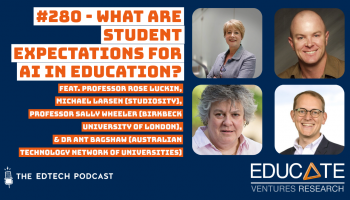
#280 – What are Student Expectations for AI in Education?
In today’s rapidly evolving educational landscape, Artificial Intelligence is emerging as a transformative force, offering both opportunities and challenges. As AI technologies continue to advance, it’s crucial to examine their impact on student expectations, learning experiences, and institutional strategies. One pressing question is: what do students truly want from AI in education? Are they reflecting on the value of their assessments and assignments when AI tools can potentially complete them? This begs the deeper question of what we mean by student success in higher education and the purpose of knowledge in an AI-driven economy. Professor Rose Luckin is joined by three wonderful guests in the studio to discuss what tools we need to support students and how we explore the potential and the limitations of AI for education.
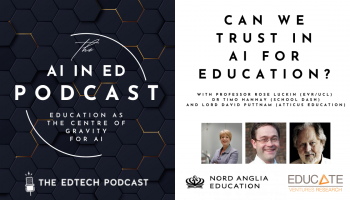
#279 – Can We Trust in AI for Education? (AI in Ed Miniseries)
Coming to the fifth and final episode of our miniseries on AI for education, host Professor Rose Luckin is joined by Timo Hannay, Founder of SchoolDash, and Lord David Puttnam, Independent Producer, Chair of Atticus Education, and former member of the UK parliament’s House of Lords. This episode and our series have been generously sponsored by Nord Anglia Education.
Today we’re going to look ahead to the near and far future of AI in education, and ask what might be on the horizon that we can’t even predict, and what we can do as humans to proof ourselves against disruptions and innovations that have, like the Covid pandemic and ChatGPT’s meteoric rise, rocked our education systems, and demanded we do things differently.
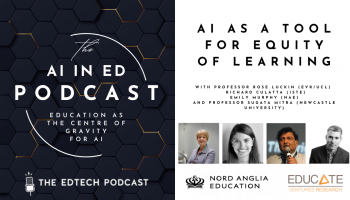
#278 – AI as a Tool for Equity of Learning (AI in Ed Miniseries)
Continuing our miniseries on AI in education with the fourth episode centred around a AI’s potential for equity of learning, host Professor Rose Luckin is joined by Richard Culatta of ISTE, Professor Sugata Mitra, and Emily Murphy of Nord Anglia Education. This episode and our series are generously sponsored by Nord Anglia Education.
In our fourth instalment of this valuable series, we look at AI’s potential to address various challenges and bridge the educational gaps that exist among different groups of students around the world. AI can analyse vast amounts of data, provide early interventions, and enhance accessibility, and as long as the deployment of the technology is appropriate to the unique context of the school, the learners, the location, and the access to devices, AI can transform education for those who need the most support.
In our third instalment of this valuable series, we head out beyond the UK and the English-speaking world to get a global perspective on AI, and ask how educators and developers around the world build and engage with AI, and what users, teachers and learners want from the technology that might tell people back home a thing or two. We examine how international use of AI might change the way we engage with AI, and we also ask why they might be doing things differently.
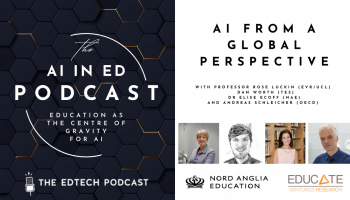
#277 – AI from a Global Perspective (AI in Ed Miniseries)
Continuing our miniseries on AI in education with the third episode centred around a global perspective on AI, host Professor Rose Luckin is joined by Andreas Schleicher of the OECD, Dr Elise Ecoff of Nord Anglia Education, and Dan Worth of Tes. This episode and our series are generously sponsored by Nord Anglia Education.
In our third instalment of this valuable series, we head out beyond the UK and the English-speaking world to get a global perspective on AI, and ask how educators and developers around the world build and engage with AI, and what users, teachers and learners want from the technology that might tell people back home a thing or two. We examine how international use of AI might change the way we engage with AI, and we also ask why they might be doing things differently.
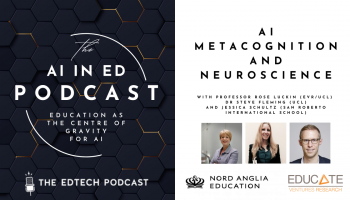
#276 – AI, Metacognition, and Neuroscience (AI in Ed Miniseries)
Continuing our new 5-episode miniseries on AI in education with the second episode on AI’s relationship to neuroscience and metacognition, host Professor Rose Luckin is joined by Dr Steve Fleming, Professor of Cognitive Neuroscience at UCL, UK, and Jessica Schultz, Academic & Curriculum Director at the San Roberto International School in Monterrey, Mexico. This episode and our series are generously sponsored by Nord Anglia Education.
Metacognition, neuroscience and AI aren’t just buzzwords but areas of intense research and innovation that will help learners in ways that until now have been unavailable to the vast majority of people. The technologies and approaches that study in these domains unlocks, however, must not be siloed or made inaccessible to public understanding. Real work must be done to bring these areas together and we are tremendously excited that this podcast will present a great opportunity to showcase what inroads have been made, where, why, and how.
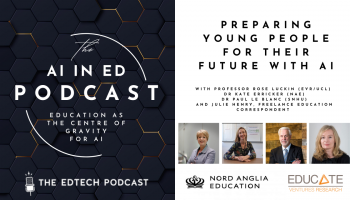
#275 – Preparing Young People for their Future with AI (AI in Ed Miniseries)
Delighted to launch this new 5-episode miniseries on AI in education, sponsored by Nord Anglia Education, host Professor Rose Luckin kicks things off for the Edtech Podcast by examining how we keep education as the centre of gravity for AI.
AI has exploded in the public consciousness with innovative large language models writing our correspondence and helping with our essays, and sophisticated images, music, impersonations and video generated on-demand from prompts. Whilst big companies proclaim what this technology can achieve and how it will affect work, life, play and learning, the consumer and user on the ground and in our schools likely has little idea how it works or why, and it seems like a lot of loud voices are telling us only half the story. What’s the truth behind AI’s power? How do we know it works, and what are we using to measure its successes or failures? What are our young people getting out of the interaction with this sophisticated, scaled technology, and who can we trust to inject some integrity into the discourse?
AI has exploded in the public consciousness with innovative large language models writing our correspondence and essays for us, and systems capable of generating sophisticated images, music, audio impersonations and video. Whilst big companies proclaim what this technology can do and how it will affect work, life, play and learning, the consumer and user on the ground and in the schools likely has little idea how it works or why, and it seems like a lot of loud voices are telling us one thing, and it’s only half the story. What’s the truth behind AI’s power? How do we know it works, and what are we using to measure its success? What are our young people getting out of the interaction with this sophisticated, scaled technology, and who can we trust to inject some sanity into the discourse?
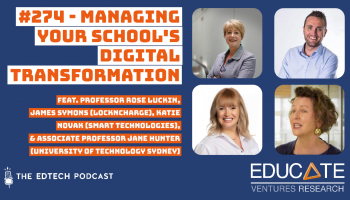
#274 – Managing Your School’s Digital Transformation
Digital Transformation! Digital Strategy! Professional Education! What do they mean, and how do we implement them in a school? Today’s episode covers the evolving demands of the classroom, teacher professional education, and digital strategy and transformation.
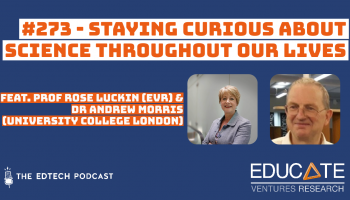
#273 – Staying curious about science throughout our lives
SCIENCE! Under discussion today are the ways in which students who were switched off the sciences at school manage to retain their curiosity about the subjects and can even reengage with it later in life. Professor Rose Luckin is very lucky to have in the online studio this week Dr Andrew Morris, Honorary Associate Professor at UCL, former president of the Education Section of the British Science Association, and author, whose book, Bugs, Drugs, and Three-Pin Plugs: Everyday Science, Simply Explained, is now available wherever books are sold.
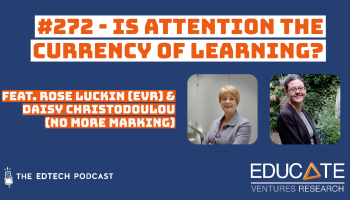
#272 – Is Attention the Currency of Learning?
Rose hosts Daisy Christodoulou, Director of Education at No More Marking in the EdTech Podcast Zoom studio this week, discussing AI regulation, evidence and effectiveness, and student outcomes in AI assessment, and what we think the future of AI-powered education might look like, and why!
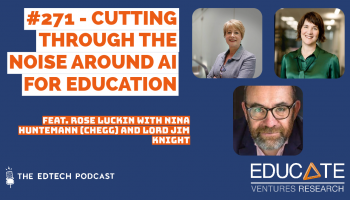
#271 – Cutting Through the White Noise Around AI for Education
Rose plays host to Nina Huntemann, Chief Academic Officer of Chegg, and Lord Jim Knight, in the EdTech Podcast Zoom studio this week, attempting to understand how best to cut through the white noise surrounding AI’s hype, misinformation, exaggeration and marketing, and determining just how positive for education AI can be if done responsibly.
